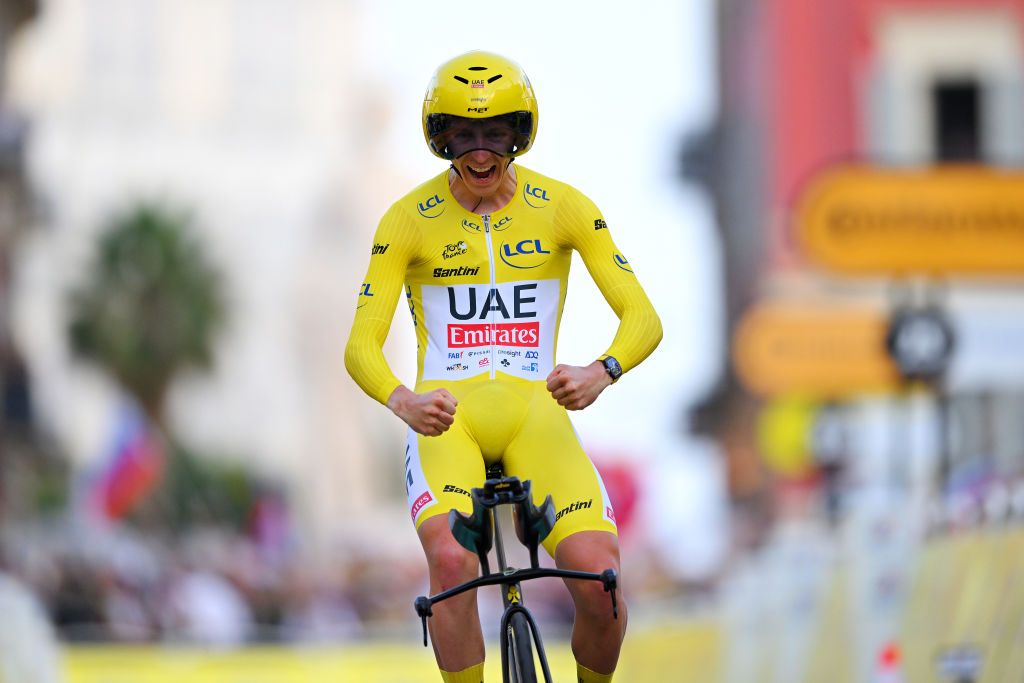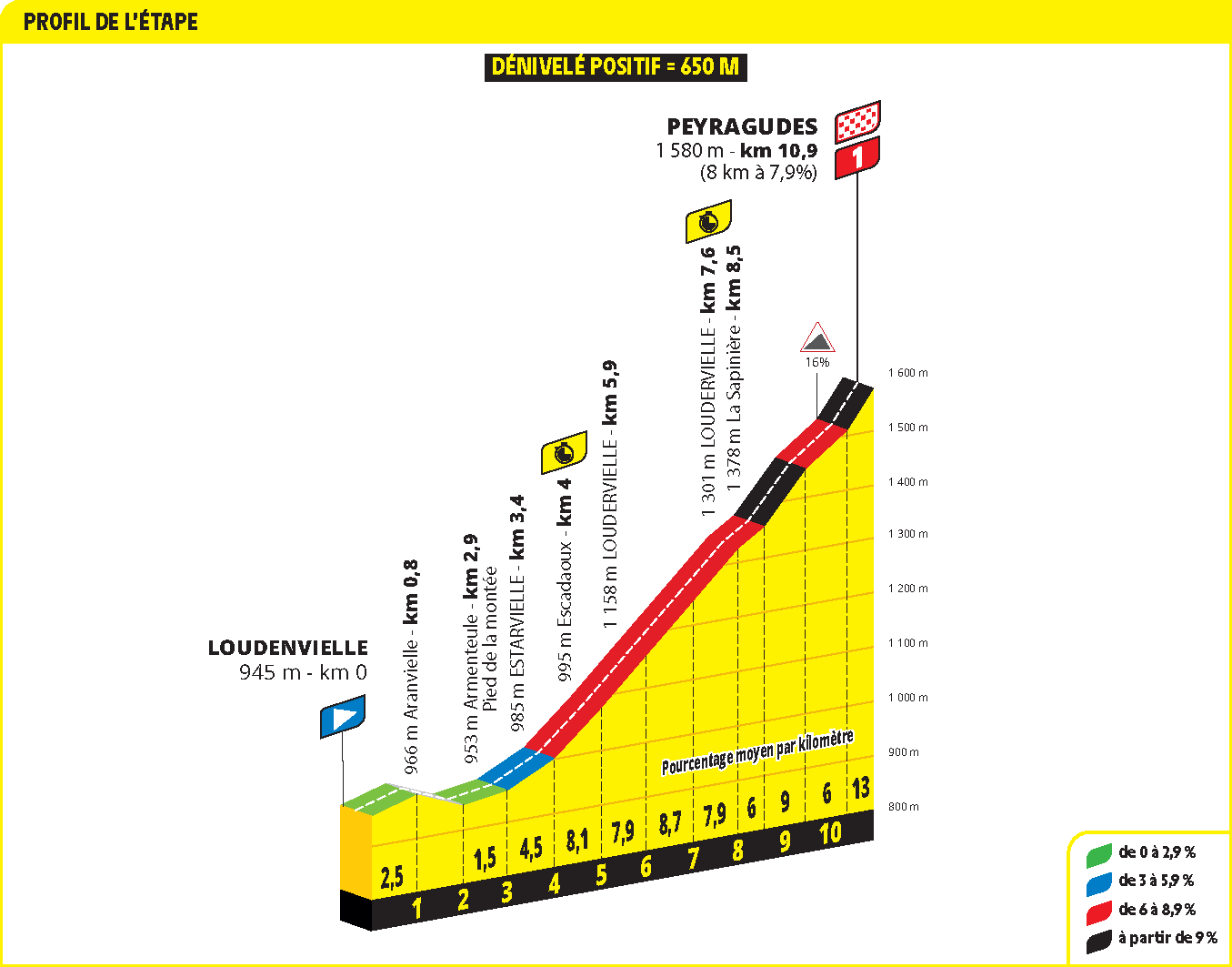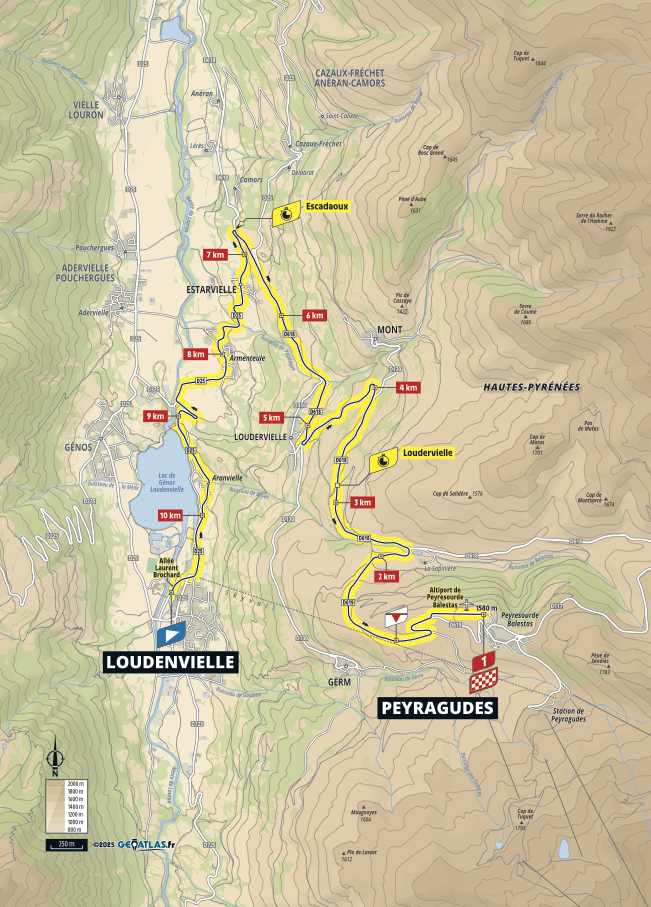
Full-blown uphill mountain time trials, like Friday's 10.9-kilometre climb to the Peyragudes altiport in the Pyrenees, are comparatively rare beasts in the Tour de France. But when they do put in an appearance, they can be the key ingredient to taking yellow in Paris.
The most famous case of a Tour mountain TT doing exactly that was in 1959, when Federico Martín Bahamontes, aka 'The Eagle of Toledo', destroyed the field on a 12.5-kilometre ascent of the never-ending loops and zig-zags up the Pûy de Dome in the Massif Central mountains.
He was the only rider to top an average speed of 20 kph that day, riding with his shorts rolled up even higher than usual for extra aerodynamics - who needs wind tunnels? Bahamontes later said, by multiple cups of coffee grabbed from a publicity stand conveniently situated at the foot of the climb, the caffeine-fuelled time damage he wreaked on the Pûy saw no fewer than nine opponents eliminated in one fell swoop.
In the top half of the results sheet, the destruction was equally spectacular. Bahamontes' closest opponent, Henri Anglade, trailed 1:26 back, while France's top time triallists Jacques Anquetil and Roger Rivière, Bahamontes' arch-rivals for overall victory, were more than three minutes down.
Anquetil and Rivière slumped to five minutes and seven minutes, respectively, on GC as a consequence, never to surface again. And while Holland's Jos Hoevenaars, a non-GC threat who'd taken the lead in a breakaway in the Pyrenees, was still in yellow by four seconds, the 1959 Tour was effectively Bahamontes' for the taking - which he duly did in the Alps a few days later.
Can a similar wipeout happen on Friday's first category time trial ascent, culminating in the punishing 16.5% slopes leading to Peyragudes altiport? Will a rider lift off on GC in the same fashion as James Bond in the prelude of Tomorrow Never Dies, filmed on the very same runway?
It's difficult to say, given reference points are hard to find in modern Grand Tours, with the last strictly comparable Tour de France TT in terms of terrain coming back in 2004 with Lance Armstrong the fastest up Alpe d'Huez.
Since then in the Tour, Jonas Vingegaard took a knockout victory in the 2023 Alpine TT at Combloux, of course. But that was on a much more rolling race profile. The same goes for Chris Froome's win in 2016 in the Sallanches uphill time trial, again on very undulating course and which even had two kilometres of downhill to finish.
Given the differences in the route profiles, just because Froome and Vingegaard subsequently won overalls (as did Armstrong on Alpe d'Huez, although he was subsequently stripped of that victory), it's hard to extrapolate.
It's true that there is the case of Bahamontes and when he conquered the Tour back in 1959, or more recently, when fellow-Spaniard Pedro Delgado rode to yellow in 1988 in part due to his uphill Alpine TT victory in Villard-de-Lans.
But according to a rough straw poll conducted by Cyclingnews amongst different team managers and riders earlier this week, it seems it is unlikely that the massive margins of 76 years ago, or even the smaller ones of 47 years ago with Delgado, will be repeated this Friday.
New history in the making
"I don't think the time gaps will be huge, even if there will be time gaps, obviously," says Rolf Aldag, team manager at Red Bull-Bora-Hansgrohe and whose rider Primož Roglič did win a Grand Tour, the 2023 Giro d'Italia, thanks to a spectacular mountain TT victory.
"It's a full-on effort, probably one of the most challenging and stressful days for the big favourites, even if the time gaps are not so big. There's the preparation, the equipment choices, the waiting… that's all super-stressful."
As Aldag told Cyclingnews, given the comparative rarity of the mountain time trial in the Tour, for the overall contenders, winning such a tough stage will be very prestigious too, no matter what happens afterwards.
"There's no saying, 'oh but he stayed on my wheel', he did this or he did that, he didn't pull, we did the work before. Here, everybody has the same distance, everybody has the same to do, so it's fair play to all.
"That's why I like the time trial - but that's why it's so stressful, too. Because there's a lot at stake here."
With a straightforward, flat first three kilometres, a further five averaging around 8% and then the steepest part in the last three, rising to an almost unbearable 16% at the top, the tricky format also makes it crucial riders calculate their strength right down to the last watt. Although, as Aldag jokingly pointed out, "They all have power metres now, don't they?"
"No, seriously, on a course like this, the idea of just 'full gas and cross your fingers' is probably not realistic.
"As I said, the power metre plays a big role. Plus, you can time your effort into different zones, where you want to hold your pace or over-pace a bit, keep thinking about the strategy you can apply, knowing it gets harder at the end.
"When the riders get to the start line, in any case, the sport director's work is done almost as soon as they start climbing.
"All the other work comes beforehand from the coaching side, the engineering side, when it comes to pacing strategy and so on.
"So I don't actually think when you're at the ramp at the start, you don't know what you're going to do at the steep part and how you're going to get there."
Nothing is left to chance, in other words, and Aldag said there will be a recon in the morning to re-familiarise themselves with the course.
The climb was last used in 2022, when Tadej Pogačar, having lost the Tour in the Alps on the Col du Granon, nonetheless beat Vingegaard at the heliport summit in the Pyrenees.
Logistics are apparently quite tricky for the teams on Friday, with the lack of side roads obliging team vehicles accompanying riders to take a massive circuit round the mountains to reach the start line again. But Aldag said the information reaped from the recon makes it worth the hassle.
Asked to predict who will likely capture the victory, Aldag predicted: "One of the guys who sits in the top five on the GC will, in any case, win the mountain time trial, I think, and from so far in mountain time trials, there won't be any surprises.
"Tadej wouldn't miss an opportunity, but I wouldn't underestimate Jonas because he lost so much in the first time trial either. It's a completely different cup of tea."
But at the other end of the spectrum, for the riders with nothing to win or lose in the TT, a mountain time trial can be one of the most enjoyable ever in their careers.
"I went up Alpe d'Huez in the 2004 time trial as a rider and it was amazing. Alpe d'Huez was special itself, but out of millions of spectators. I saw my father. So that was a super-nice experience," he said about the TT that was still considered to have one of the biggest crowds ever for a Tour stage.
"Probably around 160 riders in the peloton [of 196 starters] hardly ever hear their name being yelled at them, because you're always in a group or a bunch. And reaching a mountain top finish alone is something that hardly ever happens to the normal guys, either.
"But in a time trial, everybody has a start list, everybody knows who comes next, so I think for the riders, if you don't have to go full gas, flat-out, it's very special. Because that connection you will have with the spectators is something very important."
Regardless of the result, on Friday's first full-on mountain time trial in the Tour in over 20 years, for many riders, that connection will once again be renewed.
Stage 13 map and profile


Time checks
- Escadaoux, km. 4
- Loudervielle, km. 7.6
Stage 13 Mountains
- Col de Peyragudes (cat. 1), km. 11
How to watch stage 13 of the Tour de France
Country |
Broadcaster |
Start time |
|---|---|---|
UK |
ITV4 / ITVX (FREE) |
14:00 BST |
UK |
11:30 BST |
|
US |
06:30 ET |
|
Canada |
07:00 ET |
|
Australia |
SBS / SBS On Demand (FREE) |
21:00 AEST |
► Full guide: How to watch the Tour de France 2025
We test and review VPN services in the context of legal recreational uses. For example: 1. Accessing a service from another country (subject to the terms and conditions of that service). 2. Protecting your online security and strengthening your online privacy when abroad. We do not support or condone the illegal or malicious use of VPN services. Consuming pirated content that is paid-for is neither endorsed nor approved by Future Publishing.







